
Kilburn is an area of north west London, England, which spans the boundary of three London Boroughs: Camden to the east, City of Westminster, Brent to the west. There is also an area in the City of Westminster, known as West Kilburn and sometimes treated as a distinct locality. Kilburn High Road railway station lies 3.5 miles (5.6 km) north-west of Charing Cross.

The Ulster Defence Association (UDA) is an Ulster loyalist paramilitary group in Northern Ireland. It was formed in September 1971 as an umbrella group for various loyalist groups and undertook an armed campaign of almost 24 years as one of the participants of the Troubles. Its declared goal was to defend Ulster Protestant loyalist areas and to combat Irish republicanism, particularly the Provisional Irish Republican Army (IRA). In the 1970s, uniformed UDA members openly patrolled these areas armed with batons and held large marches and rallies. Within the UDA was a group tasked with launching paramilitary attacks; it used the cover name Ulster Freedom Fighters (UFF) so that the UDA would not be outlawed. The British government proscribed the UFF as a terrorist group in November 1973, but the UDA itself was not proscribed until August 1992.

John McMichael was a Northern Irish loyalist who rose to become the most prominent and charismatic figure within the Ulster Defence Association (UDA) as the Deputy Commander and leader of its South Belfast Brigade. He was also commander of the "Ulster Freedom Fighters" (UFF), a cover name for the UDA, overseeing an assassination campaign against prominent republican figures whose details were included in a notorious "shopping list" derived from leaked security forces documents. The UDA used the UFF name when it wished to claim responsibility for attacks, thus allowing it to remain a legal paramilitary organisation until August 1992 when it was proscribed by the British Government.

The Shankill Road bombing was carried out by the Provisional Irish Republican Army (IRA) on 23 October 1993 and is one of the most well-known incidents of the Troubles in Northern Ireland. The IRA aimed to assassinate the leadership of the loyalist Ulster Defence Association (UDA), supposedly attending a meeting above Frizzell's fish shop on the Shankill Road, Belfast. Two IRA members disguised as deliverymen entered the shop carrying a bomb, which detonated prematurely. Ten people were killed: one of the IRA bombers, a UDA member and eight Protestant civilians, two of whom were children. More than fifty people were wounded. The targeted office was empty at the time of the bombing, but the IRA had allegedly realised that the tightly-packed area below would inevitably cause "collateral damage" of civilian casualties and continued regardless. However the IRA have denied this saying that they intended to evacuate the civilians before the explosion. It is alleged, and unearthed MI5 documents appear to prove, that British intelligence failed to act on a tip off about the bombing.
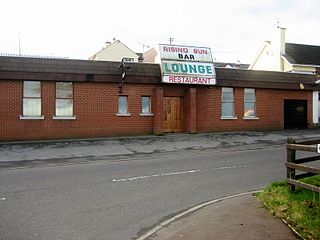
The Greysteel massacre was a mass shooting that took place on the evening of 30 October 1993 in Greysteel, County Londonderry, Northern Ireland. Members of the Ulster Defence Association (UDA), a loyalist paramilitary group, opened fire on civilians in a crowded pub during a Halloween party, killing eight and wounding nineteen. The pub was targeted because it was frequented by Catholics, though two of the victims were Protestant. The group claimed responsibility using their cover name "Ulster Freedom Fighters", saying the attack was revenge for the Shankill Road bombing by the Provisional IRA a week earlier. Four men were sentenced to life imprisonment for the massacre, but were released in 2000 under the terms of the Good Friday Agreement.
The Castlerock killings took place on 25 March 1993 in the village of Castlerock, County Londonderry, Northern Ireland. Members of the Ulster Defence Association (UDA), a loyalist paramilitary group, shot dead three Catholic civilians and a Provisional Irish Republican Army (IRA) member as they arrived for work in a van. Another was wounded. The "Ulster Freedom Fighters" (UFF) claimed it had targeted an IRA member and his "accomplices". A UDA member was later imprisoned for his part in the attack and in the Greysteel massacre several months later, but was released in 2000 under the terms of the Good Friday Agreement.
H. David "Davy" Payne was a senior Northern Irish loyalist and a high-ranking member of the Ulster Defence Association (UDA) during the Troubles, serving as brigadier of the North Belfast Brigade. He was first in command of the Shankill Road brigade of the Ulster Freedom Fighters (UFF), which was the "cover name" of the militant branch of the UDA. The group was responsible for a series of abductions and killings of mostly Catholic civilians in the early 1970s.
This is a timeline of actions by the Ulster Defence Association (UDA), a loyalist paramilitary group formed in 1971. Most of these actions took place during the conflict known as "the Troubles" in Northern Ireland. The UDA's declared goal was to defend Loyalist areas from attack and to combat Irish republican paramilitaries. However, most of its victims were Irish Catholic civilians, who were often chosen at random.
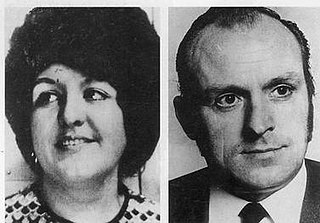
The killings of Paddy Wilson and Irene Andrews took place in Belfast, Northern Ireland on the night of 25/26 June 1973. The victims, Roman Catholic Senator Paddy Wilson and his Protestant friend Irene Andrews, were hacked and repeatedly stabbed to death by members of the "Ulster Freedom Fighters" (UFF). This was a cover name for the Ulster Defence Association (UDA), a then-legal Ulster loyalist paramilitary organisation. John White, the UFF's commander, who used the pseudonym "Captain Black", was convicted of the sectarian double murder in 1978 and sentenced to life imprisonment. White, however maintained that the UFF's second-in-command Davy Payne helped him lead the assassination squad and played a major part in the attack. Although questioned by the Royal Ulster Constabulary (RUC) after the killings, Payne admitted nothing and was never charged.
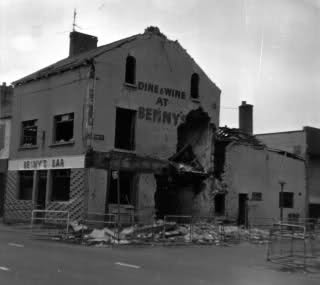
The Benny's Bar bombing was a paramilitary attack on 31 October 1972 in Belfast, Northern Ireland. A unit from the Ulster Freedom Fighters (UFF) of the Ulster Defence Association (UDA), a loyalist paramilitary group, detonated a no-warning car bomb outside the Irish Catholic-owned Benny's Bar in the dockland area of Sailortown, killing two young girls trick-or-treating in the area: Clare Hughes (4); and Paula Strong (6). Twelve of the pub's patrons were also injured in the explosion.

The Balmoral Furniture Company bombing was a paramilitary attack that took place on 11 December 1971 in Belfast, Northern Ireland. A bomb exploded without warning outside a furniture showroom on the Shankill Road in a predominantly unionist area, killing four civilians, two of them babies. It is widely believed that the bombing was carried out by members of the Provisional Irish Republican Army (IRA) in retaliation for the Ulster Volunteer Force (UVF) bombing of McGurk's Bar a week earlier, which killed 15 Catholic civilians.
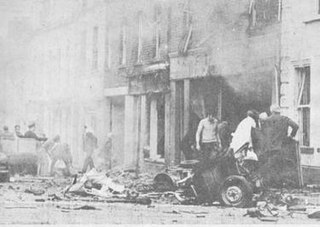
On 12 June 1973 the Provisional IRA detonated two carbombs in Coleraine, County Londonderry, Northern Ireland. The first bomb exploded at 3:00 pm on Railway Road, killing six people and injuring 33; several lost limbs and were left disabled for life. A second bomb exploded five minutes later at Hanover Place. This did not cause any injuries, although it added to the panic and confusion in the area. The IRA had sent a warning for the second bomb but said it had mistakenly given the wrong location for the first.

Raymond Elder was a Northern Irish loyalist paramilitary and a prominent figure within the Ulster Defence Association's South Belfast Brigade. Suspected by security forces of playing a role in numerous killings, including the Sean Graham shooting, he was shot dead by the Irish Republican Army on the Ormeau Road in 1994.
The Rose & Crown Bar bombing was a bomb attack carried out against a Catholic-owned pub in Belfast. The attack was carried out by the loyalist paramilitary group the Ulster Volunteer Force (UVF) just less than two weeks before the start of the Ulster Workers' Council strike of May 1974 which brought down the Sunningdale power sharing agreement and just 15 days before the UVF carried out the Dublin and Monaghan bombings which killed 34 and injured 300 people, the highest casualty rate in a single day during The Troubles in either Ireland or Britain.
The Strand Bar Bombing was a bomb attack on a pub in Belfast, Northern Ireland on 12 April 1975, during the Troubles. The Ulster Volunteer Force (UVF), a loyalist paramilitary group, threw an improvised bomb into a pub frequented by Catholics in the Short Strand neighbourhood, killing six civilians and injuring about fifty others. It took place during a spate of tit-for-tat attacks by loyalists and Irish republican paramilitaries. The attack was claimed by the UVF unit known as the Red Hand Commando (RHC).
The following is a timeline of actions during The Troubles which took place in the Republic of Ireland between 1969 and 1998. It includes Ulster Volunteer Force bombings such as the Dublin and Monaghan bombings in May 1974, and other Loyalist bombings carried out in the 1970s, 80s & 90s, the last of which was in 1997. These attacks killed dozens of people and injured hundreds more. Also actions carried out by Irish Republicans including bombings, prison escapes, kidnappings, and gun battles between the Gardaí (police) and the Irish Defence Forces against Republican gunmen from the Irish National Liberation Army, the Provisional Irish Republican Army, and a socialist-revolutionary group, Saor Éire. These attacks killed a number of civilians, police, soldiers, and Republican paramilitaries.
The Glasgow pub bombings were two bomb attacks in Glasgow, Scotland, carried out by the Ulster Volunteer Force (UVF) on 17 February 1979. The UVF bombed two pubs frequented by Catholics: the Old Barns in Calton and, 15 minutes later, the Clelland Bar in Gorbals. Five people were injured, all at the Clelland Bar. The pubs were targeted because they were allegedly used for fundraising for Irish republicans in Northern Ireland. The attack sparked fears that sectarian terrorism would erupt in Scotland as a spillover of the Troubles. Experts believe a Provisional Irish Republican Army (IRA) veto on bombing operations in Scotland prevented the situation from escalating.
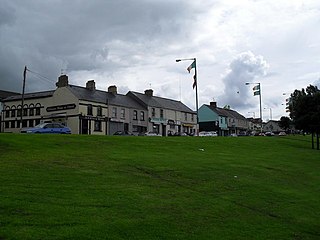
The Top of the Hill Bar shooting, or Annie's Bar massacre, was a mass shooting in Derry, Northern Ireland on 20 December 1972, during the Troubles. Five civilians were killed when members of the Ulster Defence Association (UDA), a loyalist paramilitary group, opened fire on the customers in a pub frequented by Catholics.

The Talbot Arms pub bombing took place on 30 November 1974, and was carried out by the Provisional Irish Republican Army (IRA). Eight people were injured in the attack, which involved the IRA throwing homemade bombs through the pub's window. Only one of the devices exploded; the other was taken as evidence and used to discover how the unit assembled its devices.












